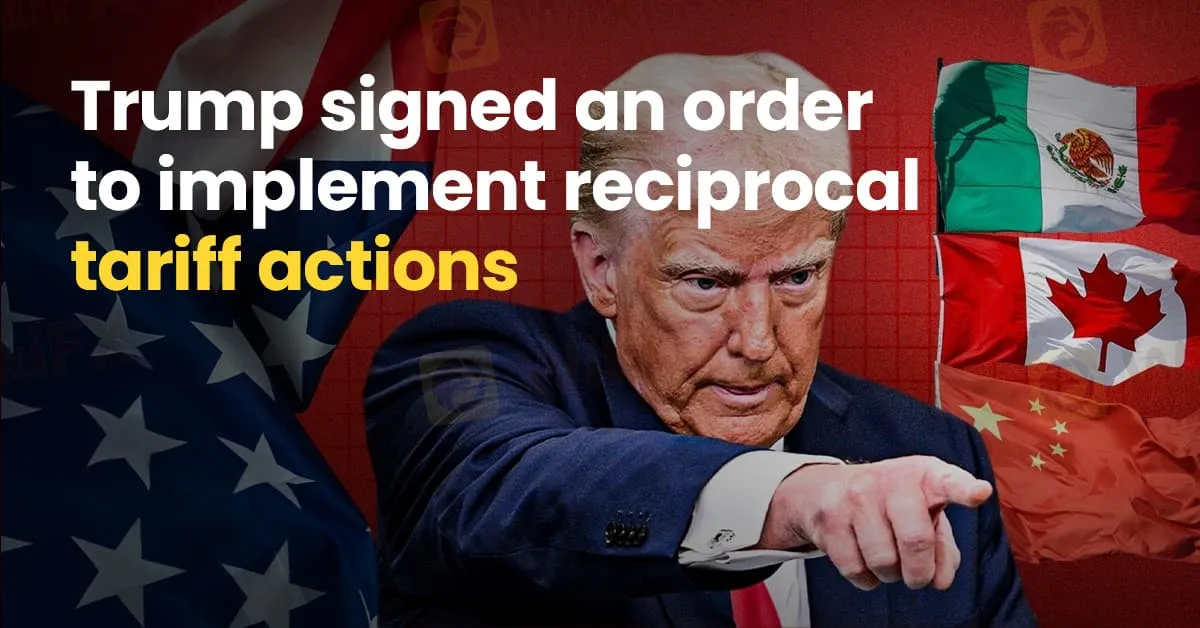简体中文
繁體中文
English
Pусский
日本語
ภาษาไทย
Tiếng Việt
Bahasa Indonesia
Español
हिन्दी
Filippiiniläinen
Français
Deutsch
Português
Türkçe
한국어
العربية
Trump signed an order to implement reciprocal tariff actions
Abstract:The directive includes calculating duties to match those other countries charge and addressing non-tariff barriers such as vehicle safety rules and value-added taxes that hinder U.S. exports.

On February 13, 2025, President Donald Trump signed a memorandum directing his economic team to develop plans for implementing reciprocal tariffs on all countries that impose tariffs on U.S. imports. This strategy aims to ensure fairness by matching the tariffs charged by other nations on American goods. The directive includes calculating duties to match those other countries charge and addressing non-tariff barriers such as vehicle safety rules and value-added taxes that hinder U.S. exports.
According to Reuters, the Key Aspects of the Reciprocal Tariff Plan include:
- Targeted Countries: The plan focuses on major trading partners, including China, Japan, South Korea, and the European Union.
- Implementation Timeline: While the memorandum initiates the development process, the new tariffs are not expected to be levied immediately. White House officials have indicated that the administration aims to move quickly, suggesting a timeline of “weeks” rather than “months” for implementation.
- Economic Implications: The announcement has raised concerns about potential economic repercussions, including fears of a global trade war and the possibility of increased consumer prices. However, Wall Street responded positively, relieved that new tariffs were not immediately implemented.
Context and Background
This move is part of President Trump's broader efforts to address trade imbalances and promote fair trade practices. The reciprocal tariff plan builds upon previous actions, such as the 25% tariffs on steel and aluminum imports and the 10% tariffs on Chinese goods. The administration's approach reflects a shift towards more protectionist trade policies, aiming to level the playing field for U.S. industries.
Potential Global Impact
The implementation of reciprocal tariffs could lead to significant changes in global trade dynamics. Countries affected by these tariffs may seek to negotiate trade agreements to reduce or eliminate the new duties. Additionally, businesses may need to adjust their supply chains and pricing strategies in response to the changing trade environment.
As the Trump administration moves forward with this plan, the global community will be closely monitoring the developments and their potential impact on international trade relations.

Disclaimer:
The views in this article only represent the author's personal views, and do not constitute investment advice on this platform. This platform does not guarantee the accuracy, completeness and timeliness of the information in the article, and will not be liable for any loss caused by the use of or reliance on the information in the article.
Read more

IC Markets Global Launches Aggressive Global Expansion Amid Record Growth
April 2025 — IC Markets Global, a global leader in online trading, has unveiled a bold international expansion strategy following a record-breaking year. With a strong focus on innovation, client service, and regulatory compliance, the broker is strengthening its global infrastructure and brand presence.

Japan’s Economy Under High Tariffs: A Gloomy Outlook
Export restrictions, currency fluctuations, and upcoming tariff talks cloud Japan's economic outlook.

FCA Strengthens Global Engagement with New US and Asia-Pacific Offices
In a strategic move to broaden its international footprint, the Financial Conduct Authority (FCA) is establishing its first-ever physical presence in both the United States and the Asia-Pacific (APAC) region. This initiative aims to reinforce the UK's status as a global hub for financial services and foster deeper regulatory cooperation and market access.

PU Prime Teams Up with AFA to Champion Excellence in Football and Trading
PU Prime partners with Argentina’s national football team, AFA, to promote forex trading, financial education, and global brand expansion in key markets.
WikiFX Broker
Latest News
ICM.com Secures UAE License, Boosts Middle East Expansion
Navigating the Dollar’s Fall: Investor Strategies Unveiled
WikiFX "World Elite Trading Championship" Concludes Successfully
Engineer Defrauded of RM156,000 in ‘Perniagaan Bos’ Investment Scam
Cracking the RM3.17 Billion MBI Scam: 8 Arrested, Including 4 Datuks
US stock markets rise on Trump tariff rollback
Singapore Authorities Warn Public of OneMotoring Phishing Scam, $407K Lost
4 Firms Named by FCA for Operating Without Authorisation or Impersonating Licensed Companies
False Promises, Real Losses: The Dark Reality of Online Trading Scams
14 Abusive Websites Blocked by CONSOB in Latest Crackdown
Currency Calculator


